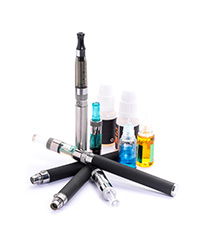 The use of e-cigarettes, or vaping, has become a common alternative to smoking traditional tobacco. However, its long-term health effects are not yet fully known. Here are some common questions about vaping and how it compares to smoking regular tobacco.
The use of e-cigarettes, or vaping, has become a common alternative to smoking traditional tobacco. However, its long-term health effects are not yet fully known. Here are some common questions about vaping and how it compares to smoking regular tobacco.
Q: How does vaping work?
A: Vaping refers to the use of electronic cigarettes, which are also known as vaporizers, vape pens, e-cigarettes, mods or electronic nicotine delivery systems (ENDS). E-cigarettes vary in shape and size, but they all contain a liquid that is heated until it turns into a vapor and then inhaled.
Q: Is vaping addictive?
A: Vapor from e-cigarettes usually contains nicotine, a highly addictive chemical. Studies have also shown that some e-liquids contain other cancer-causing chemicals and toxins, heavy metals, and other addictive compounds.
Q: What other health concerns are there?
A: Another major concern is the number of young people who use e-cigarettes. Multiple studies suggest that teenagers who smoke e-cigarettes are more likely to move on to tobacco or other drugs. This is because of the effect nicotine has on the brain's reward system. Nicotine is also dangerous for a teen's developing brain—it can cause problems with attention span and learning, and raise risks for mood disorders and long-term problems with impulse control.
Q: Is vaping healthier than traditional smoking?
A: Vaping is not good for your health. However, it is less harmful for you than smoking if used as a complete tobacco replacement. Because vaping can encourage the brain to become more easily addicted to other drugs, experts recommend that you don't start using e-cigarettes if you have never smoked before.
Q: Can vaping help you quit smoking regular cigarettes?
A: There is currently no sufficient evidence that e-cigarettes help smokers quit. In fact, some studies have found that people who tried to use e-cigarettes as a quit aid were less likely to quit smoking than those who didn't. There are seven other smoking cessation methods approved by the U. S. Food and Drug Administration that can help smokers quit effectively and safely.
Sources: Centers for Disease Control and Prevention; National Institute on Drug Abuse; U.S. Food and Drug Administration